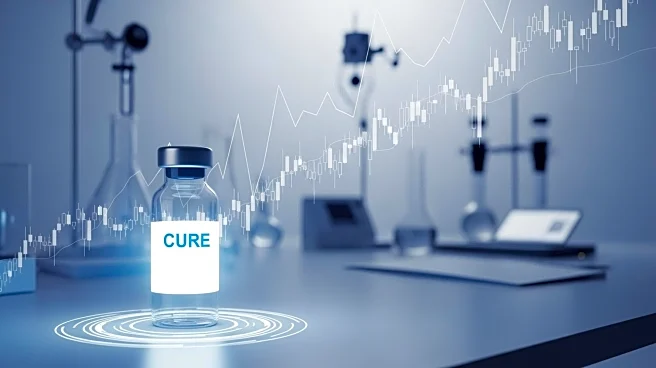What's Happening?
Inhibrx Biosciences has announced significant results from its Phase 2 'ChonDRAgon' study, which met its primary endpoint in treating advanced chondrosarcoma. The study demonstrated that the drug Ozekibart
(INBRX-109) reduced the risk of progression or death by 52% and more than doubled median progression-free survival compared to placebo. The positive trial results have led to a substantial increase in Inhibrx's stock value, with shares rising approximately 70% intraday and further increasing in after-hours trading. The company plans to file a Biologics License Application in the second quarter of 2026, potentially making Ozekibart the first systemic therapy for chondrosarcoma.
Why It's Important?
The success of Inhibrx's trial is a significant development in the treatment of chondrosarcoma, a rare bone cancer with no approved systemic therapies. The promising results could lead to the first approved drug for this condition, offering new hope to patients. The stock surge reflects investor optimism about the potential market impact of Ozekibart. If approved, the drug could position Inhibrx as a leader in the oncology sector, particularly in treating hard-to-treat cancers. The broader implications include potential advancements in cancer treatment and increased investor interest in biotech innovations.
What's Next?
Inhibrx plans to file a Biologics License Application in Q2 2026, aiming for FDA approval of Ozekibart. The company will present full trial data at the Connective Tissue Oncology Society meeting in November 2025. Continued monitoring of follow-on cohorts and completion of enrollment in other oncology trials are expected later in 2025. The regulatory approval process will be crucial in determining the drug's market entry and impact. Stakeholders, including investors and healthcare professionals, will closely watch these developments.
Beyond the Headlines
The trial results highlight the ethical and medical importance of developing treatments for rare cancers. The success of Ozekibart could encourage further research and investment in orphan drug development, potentially leading to breakthroughs in other rare diseases. The stock market reaction underscores the volatility and high-risk nature of biotech investments, where clinical trial outcomes can significantly impact company valuations.










